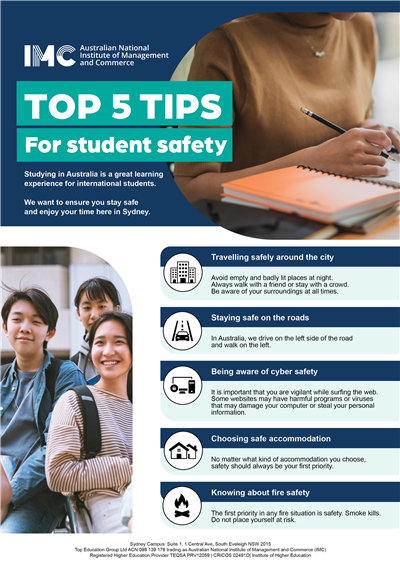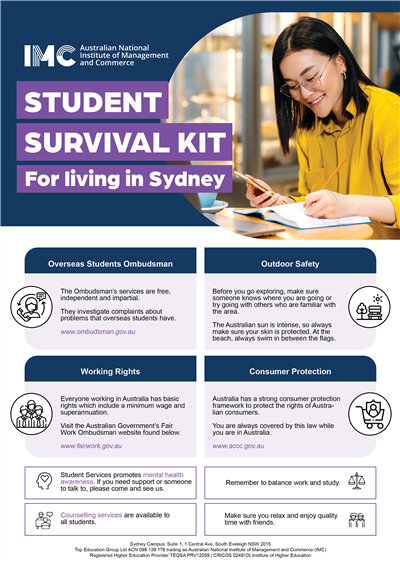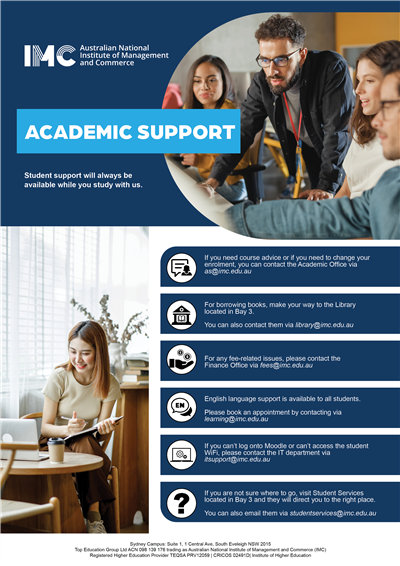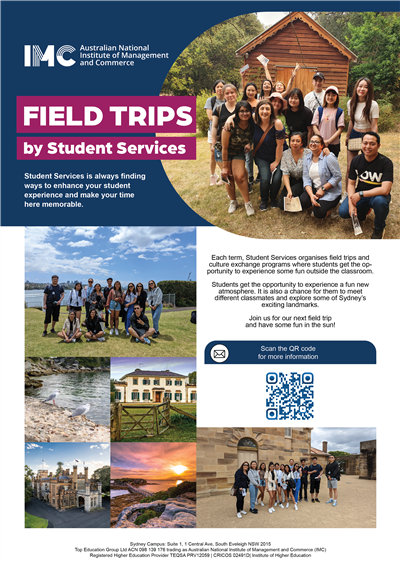Student Safety and Wellbeing
At IMC, the safety and wellbeing of our students and staff across all campuses are our highest priorities. We are committed to providing a safe, healthy, and welcoming environment where everyone feels secure and supported.
While Australia is generally a safe place to live and study, it is essential to remain aware of potential risks, particularly when traveling around your campus city. We encourage you to take basic precautions to minimize the chances of an incident occurring. This is especially important when you first arrive and are adjusting to life in a new environment.
By staying informed and prepared, you can make the most of your time at IMC while ensuring your personal safety and wellbeing.
Health and Emergency Services
For all IMC students, knowing where to find help in case of an emergency is essential. Below is a list of important contacts and services to ensure your safety and well-being:
Emergency Services (Police, Fire, Ambulance):
Dial 000 for any life-threatening emergency across Australia.Health Direct Australia:
Call 1800 022 222 for 24/7 health advice from a registered nurse.Lifeline Australia (24/7 Crisis Support):
Call 13 11 14 or visit the Lifeline website for crisis support and counseling services.Beyond Blue (Mental Health Support):
Call 1300 22 4636 or chat online for advice, information, and mental health support.Sydney Campus:
- Royal Prince Alfred Hospital (RPAH): (02) 9515 6111
- Nearest Medical Centre: Eveleigh Family Practice, (02) 9690 1328
Perth Campus:
- Royal Perth Hospital: (08) 9224 2244
- Nearest Medical Centre: Hay Street Medical Centre, (08) 9321 3130
Hobart Campus:
- Royal Hobart Hospital: (03) 6166 8308
- Nearest Medical Centre: Argyle Street General Practice, (03) 6231 6644
IMC Counselling Services:
Email counselling@imc.edu.au to arrange confidential support for any mental health or personal concerns.
For students needing immediate mental health support, the following services are available 24/7:
Lifeline Australia (Crisis Support):
Call 13 11 14 or visit www.lifeline.org.au for 24-hour crisis support and suicide prevention services.Beyond Blue (Mental Health Support):
Call 1300 22 4636 or chat online at www.beyondblue.org.au for free 24/7 mental health support and resources.Kids Helpline (Ages 5–25):
Call 1800 55 1800 or visit www.kidshelpline.com.au for free, confidential counseling for young people, available 24/7.Headspace (Young People Aged 12–25):
Call 1800 650 890 or chat online at www.headspace.org.au for mental health support, drug and alcohol services, and work or study-related assistance.Suicide Call Back Service (Counselling and Support):
Call 1300 659 467 or visit www.suicidecallbackservice.org.au for 24/7 phone and online counseling for people at risk of suicide or affected by suicide.SANE Australia (Mental Health Support):
Call 1800 18 7263 or chat online at www.sane.org for support with complex mental health issues.eheadspace (Online and Phone Support for Young People):
Visit www.eheadspace.org.au for 24/7 online support and mental health resources for young people.
Personal and Public Safety
- Plan Your Journey: Always plan your trip home, especially at night. Let someone know your expected arrival time.
- Travel with Others: Whenever possible, travel with a friend or in a group to increase safety.
- Secure Your Belongings: Keep your bag and personal items close to your body and in sight at all times to prevent theft.
- Avoid Hitchhiking: Never accept rides from strangers.
- Use Safe Pedestrian Routes: Stick to well-lit pedestrian walkways and cross at designated pedestrian crossings or traffic lights.
- Stay Aware: Be mindful of your surroundings and trust your instincts if something doesn’t feel right.
- Stay in Well-Populated Areas: Avoid waiting at isolated bus stops, train stations, or tram stops, particularly at night.
- Plan Your Trip: Check transport timetables in advance to minimize waiting times, especially after dark.
- Choose Safe Train Carriages: When traveling by train at night, choose carriages near the driver or guard, as they are typically better lit and safer.
- Move If You Feel Uncomfortable: If you find yourself alone in a train carriage, consider moving to a busier one or closer to the front of the train for added security.
- Sit Where You Feel Comfortable: In taxis or ride-sharing vehicles, choose to sit in the front or back seat based on what makes you feel safest.
- Know Your Destination: Always have the address of your destination ready before getting into a taxi or ride-share.
- Choose the Route: Clearly communicate the route you’d prefer to take to the driver. Don’t hesitate to speak up if the driver goes a different way than expected.
- Stay Safe with Drop-Offs: If you don’t want the driver to know your exact address, consider asking to be dropped off a short distance away from your home.
- Use Ride-Share Features: Ride-sharing apps like Uber and Lyft offer built-in safety features such as GPS tracking, sharing your trip status with friends, and the ability to report concerns directly through the app.
- Verify the Driver: Before getting into a ride-share, confirm that the car, driver, and license plate match the details provided in the app.
- Keep Doors Locked: Always keep your doors locked, whether you’re at home or going out. This is a simple but essential step to securing your home.
- Secure Windows: Lock all windows when you leave the house and in any rooms you’re not currently using, even when you’re home.
- Don’t Let Strangers In: Never let strangers into your home, even if they appear to be in need. Always verify their identity through a peephole or intercom.
- Be Cautious Online: Be mindful of the personal information you share on social media. Strangers can use these details to locate or identify you.
- Smoke Alarms Are Vital: Smoke alarms can save lives by alerting you to smoke or fire in your home. Never tamper with them or remove their batteries.
- Report Break-Ins Immediately: If you arrive home and notice signs of a break-in, leave the property immediately and contact the police. Do not enter until you’ve been advised it’s safe.
As an international student, you may need to exchange currency when you first arrive or throughout your stay. To ensure your safety, always use licensed and reputable services such as banks or official currency exchange offices. Avoid informal exchanges through social media or unverified sources, as these can lead to scams. If you think you’ve been involved in a fraudulent exchange, act quickly by contacting your financial institution and local consumer protection agency. International students should also take extra care to familiarize themselves with local currency exchange rates and safe financial practices. Protecting yourself early can help minimize potential loss and ensure a smoother financial experience while studying abroad.
- Use Licensed Services: Always exchange currencies at licensed and reputable businesses such as banks or official currency exchange offices. Avoid arranging currency exchanges through social media or informal means.
- Beware of Scams: If you suspect that you’ve been scammed or misled during a currency exchange, take immediate action to protect yourself.
- Contact your financial institution to report the issue.
- Reach out to your local consumer protection agency for advice on next steps.
- Talk to someone you trust or seek counseling services if you need emotional support after experiencing fraud.
- Limit the Damage: Acting quickly can help limit further financial loss and protect you from future scams. Always be cautious and verify the legitimacy of any exchange service before proceeding.
Fire Safety in Australia
Fire safety is a critical concern, especially in Australia where bushfires can be a significant risk during hot, dry seasons. Whether you’re in an urban area, on campus, or exploring the outdoors, it’s important to stay aware and prepared. Follow these essential fire safety tips:
- Stay Informed: During bushfire season, regularly check local fire warnings and weather conditions. You can stay updated through the Fires Near Me app or local news services.
- Have an Emergency Plan: If you’re living near bushland, have an emergency plan in place. Know evacuation routes and have an emergency kit ready, including essentials like water, food, first aid supplies, and important documents.
- Avoid Fire-Prone Areas: If there’s a fire risk, avoid camping, hiking, or driving through bushfire-prone areas. If you must travel, have a contingency plan in case conditions worsen.
- Follow Evacuation Orders: If authorities issue evacuation warnings, act quickly. Bushfires can spread rapidly, and it’s crucial to evacuate as instructed by emergency services.
- Know the Fire Exits: Familiarize yourself with the fire exits and evacuation routes in your residence, campus buildings, and public spaces.
- Install and Check Smoke Alarms: Ensure that your accommodation has working smoke alarms, and never tamper with them. Smoke alarms are vital for early warning in the event of a fire.
- Use Cooking Appliances Safely: If you’re cooking, never leave stoves, ovens, or other appliances unattended. Make sure to turn off all appliances after use.
- Don’t Overload Power Outlets: Avoid overloading electrical outlets or using faulty appliances, as these are common causes of electrical fires.
- Avoid Open Flames: Be cautious with candles or open flames indoors, and never leave them unattended.
- Report Fire Hazards: If you notice any fire hazards, such as blocked exits or faulty equipment, report them immediately to building management or campus security.
- Follow Fire Safety Regulations: If you’re outdoors, especially when camping or barbecuing, always follow local fire safety regulations. Avoid lighting open fires in restricted areas, and never leave a fire unattended.
- Stay Calm: If a fire occurs, stay calm and follow the evacuation plan. Leave the building immediately and avoid using elevators.
- Call Emergency Services: Dial 000 for fire emergencies and provide details of your location.
Outdoor Safety
Australia offers a range of outdoor activities, from camping to surfing. When participating in these activities, follow these general safety tips:
- Know Your Limits: Whether it’s surfing, hiking, or cycling, understand your skill level and avoid dangerous conditions.
- Stay Equipped: For activities like camping or bushwalking, ensure you have the necessary gear, including navigation tools, first aid kits, and emergency contacts.
- Respect Nature: Always dispose of waste responsibly, and leave natural areas as you found them.
- Be Aware of Fire Safety: In Australia, bushfires can occur during hot, dry weather. If camping or barbecuing, follow all fire safety regulations, and never leave a fire unattended.
Australia experiences high levels of UV radiation, so it’s important to take precautions to protect your skin from sun damage. Whether you’re spending time outdoors for study or leisure, remember these sun safety tips:
- Wear Sunscreen: Use broad-spectrum sunscreen (SPF 30 or higher) and reapply every two hours, especially after swimming or sweating.
- Cover Up: Wear protective clothing, including a wide-brimmed hat, sunglasses, and lightweight long sleeves.
- Stay in the Shade: Whenever possible, seek shade between 10 a.m. and 4 p.m., when UV rays are strongest.
- Stay Hydrated: Drink plenty of water throughout the day to avoid dehydration while under the sun.
Australia is known for its beautiful bushland, but outdoor adventures in the bush come with certain risks. To stay safe while hiking or exploring:
- Plan Your Trip: Always let someone know where you’re going and when you plan to return. Stick to marked trails and maps.
- Check the Weather: Avoid hiking or exploring during extreme heat or bushfire warnings.
- Carry Supplies: Bring enough water, food, a map, and a fully charged phone in case of emergencies. Wearing sturdy footwear and protective clothing is essential.
- Beware of Wildlife: Be cautious of Australian wildlife, including snakes and spiders. If bitten, seek medical attention immediately.
Australia’s coastline is beautiful but can be dangerous if precautions aren’t taken. To enjoy the beach and ocean safely:
- Swim Between the Flags: Always swim in designated areas marked by red and yellow flags, where lifeguards are present.
- Be Aware of Rips: If caught in a rip current, don’t panic. Swim parallel to the shore until you’re free of the current, then head back to land.
- Check Conditions: Always check the weather and water conditions before swimming, surfing, or boating.
- Use Sun Protection: Don’t forget sun safety while enjoying the beach—wear sunscreen, a hat, and sunglasses.
Cyber Safety
In today’s digital age, staying safe online is just as important as physical safety. As students increasingly rely on technology for study and communication, it’s essential to be aware of potential cyber threats and scams. Here are some key tips to help you protect yourself online:
- Protect Your Personal Information: Avoid sharing personal details like your address, phone number, or financial information on public platforms or with people you don’t know.
- Use Strong Passwords: Create strong, unique passwords for each of your online accounts, and update them regularly. Consider using a password manager to keep track of them.
- Enable Two-Factor Authentication: Wherever possible, enable two-factor authentication (2FA) on your accounts to add an extra layer of security.
- Be Wary of Phishing Scams: Phishing scams attempt to steal your personal information by tricking you into clicking on malicious links or sharing sensitive data. Always verify the sender’s email and avoid clicking on suspicious links.
- Keep Your Devices Updated: Regularly update your computer, phone, and apps to protect against the latest security threats. Ensure your antivirus software is up to date as well.
- Avoid Public Wi-Fi for Sensitive Transactions: Public Wi-Fi networks can be insecure, making it easier for hackers to intercept your data. Avoid conducting financial transactions or accessing sensitive information while on public Wi-Fi.
Scammers often target international students through email, phone calls, and social media. Here’s how to avoid falling victim to common scams:
- Recognize Common Scams: Be cautious of unexpected messages or phone calls requesting personal information, money, or offering services that seem too good to be true. Common scams include fake job offers, scholarship offers, or claims from fake government agencies.
- Verify Official Communications: Scammers may impersonate authorities like the immigration department or tax office. Always verify the legitimacy of any communication by contacting the organization directly through official channels.
- Don’t Send Money to Strangers: Avoid sending money, gift cards, or cryptocurrency to anyone you don’t know personally. Legitimate businesses or government agencies will never ask for payment via these methods.
- Beware of Social Media Scams: Avoid arranging currency exchanges, buying items, or accepting services through unverified social media accounts. Scammers often use platforms like Facebook or Instagram to deceive unsuspecting users.
- Report Suspicious Activity: If you believe you’ve encountered a scam, report it to Scamwatch (Australian Competition & Consumer Commission), your financial institution, or the Australian Cyber Security Centre (ACSC).
If you think you’ve fallen victim to a scam or shared personal information with a scammer, take immediate action:
- Contact Your Bank: Notify your bank or financial institution to freeze your accounts or take measures to protect your finances.
- Report the Scam: File a report with Scamwatch or the Australian Cyber Security Centre (ACSC).
- Seek Support: If you feel anxious or distressed after being scammed, reach out to IMC’s counselling services or a trusted support network.
Cyberbullying: Protecting Yourself Online
Cyberbullying is a growing concern, especially in a world where much of our communication happens online. Cyberbullying involves using digital platforms such as social media, messaging apps, and email to harass, threaten, or intimidate someone. It can take many forms, from hurtful comments and spreading false information to deliberate exclusion or even threats of harm. At IMC, we are committed to fostering a safe and respectful digital environment for all students. Here’s how you can protect yourself and others from cyberbullying:
- Harassment: Repeatedly sending hurtful, offensive, or threatening messages through digital platforms.
- Spreading Rumors: Sharing false information or gossip to damage someone’s reputation.
- Exclusion: Deliberately excluding someone from online groups, chats, or social media activities.
- Impersonation: Pretending to be someone else online to damage their reputation or relationships.
- Threats and Intimidation: Using online platforms to make threats or intimidate someone into silence or submission.
- Don’t Respond: Avoid engaging with cyberbullies, as responding can sometimes escalate the situation.
- Block the Bully: Use the platform’s settings to block the person responsible for the bullying.
- Save Evidence: Keep records of the bullying, such as screenshots or copies of messages. This can be useful if you need to report the incident.
- Report the Incident: Most social media platforms and messaging apps have options to report abusive behavior. Additionally, report the bullying to IMC staff or the Student Services team for support.
- Seek Support: Talk to someone you trust, such as a friend, counselor, or family member, for emotional support. IMC’s counselling services are also available to help you navigate any distressing situations.
- Be Mindful Online: Think carefully before posting comments or sharing content online. Treat others with respect and kindness, just as you would in face-to-face interactions.
- Respect Privacy: Avoid sharing personal or sensitive information about others without their consent.
- Stand Up Against Bullying: If you witness cyberbullying, don’t be a bystander. Support the person being bullied by reporting the incident and offering them help.
- Educate Yourself and Others: Learn about the impact of cyberbullying and share resources with your friends and peers to create a more supportive online environment.
If you’ve experienced cyberbullying, know that you’re not alone, and help is available. IMC’s counselling services offer confidential support to help you cope with the emotional impact of bullying. You can also contact IMC directly to report the incident via complaints@imc.edu.au.






